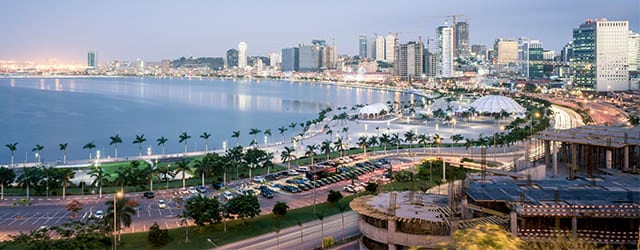African nations can no longer get by on mineral wealth and commodities alone—and they know it.

Back To Supplment
Five years ago, a somber OECD report jolted African nations with the prospect of a grim future if they continued to rely on existing export trajectories. Since then, five countries focused on in the OECD case study—Benin, Kenya, Tunisia, South Africa and Angola—have kicked into gear to diversify their economies and strengthen their earnings base. They’ve had varying degrees of success.
The report—which could pretty much be summed up as “diversify or die”—warned that in an increasingly competitive world, Africa’s continued dependence on its vast agricultural and mineral resources for export earnings was not only unsustainable in the long term but invited disaster. Fluctuating prices for commodities, which are usually consumed by advanced nations, were bound to result in unstable earnings.
The organization recommended development of minerals processing, expansion of manufacturing, production, export of nontraditional agricultural and industrial products, and expansion of service sectors such as tourism.
Five years later, Global Finance looks at these nations and where they stand.
Benin, the small nation that borders Nigeria (Africa’s biggest economy) to the west, has indeed moved to reduce its dependence on agriculture, especially cotton, and to embrace economic partners other than its biggest one, Nigeria, with whom it now competes in transport routes.
Frank Ojadi, who teaches logistics and supply chain management at the Lagos Business School of Pan-Atlantic University, said Benin is capitalizing on its position as a gateway from its Cotonou seaport to landlocked neighbors in the north. It has set up a system of competitive tariffs that’s getting results.
“It’s not just that they have low tariffs, but they have three types of tariffs: one for domestic use; one for trans-shipment into Nigeria; and one for landlocked countries,” says Ojadi.
Benin strives to make its routes competitive, especially compared with Nigeria’s.
Its land freight corridor that runs up to N’djamena, the capital of Chad, is cheaper and has fewer disruptive checkpoints than the route running from Nigeria.
Kenya, one of the most diversified economies in Africa, remains quite dependent on the agricultural sector (which makes up 40% of total exports), led by tea, flowers, fruit and coffee. It struggles with terrorism, periodic ethnic violence and corruption, all of which are a drag on tourism and have undermined efforts to broaden the economy, according to Jan Dehn, head of research at Ashmore Investment Management.
Other East African countries (particularly Tanzania) are the major buyers of tea, coffee and fruits from Kenya, notes Abiola Rasaq, head of investor relations at United Bank for Africa, Lagos.
“Europe has yet to recover from the financial crisis,” he says. “Security concerns have reduced tourist traffic; tea and coffee prices are down; all of these have weakened foreign currency earnings and overall fiscal revenue.”
The cornerstones of Kenya’s economic diversification program, tagged Vision 2030, include Nairobi Metro 2030, which aims to make the nation’s capital a world-class African city, and its own Silicon Valleylike infotech hub in East Africa..
In 2010 the OECD identified Tunisia as having a number of comparative advantages, including political stability and a location that allows easy access to European, Middle Eastern and African markets and enables companies to link into European Union supply chains. But the birthplace of the Arab Spring is still trying to solidify its political transition and move to greater economic independence—in Tunisia’s case, away from the EU. Europe, led by France, accounts for two-thirds of Tunisia’s exports.
Security concerns have reduced [Kenya’s] tourist traffic; tea and coffee prices are down; all of these have weakened foreign currency earnings and overall fiscal revenue.
~ Abiola Rasaq, United Bank for Africa
Unlike the other nations in the group, the North African country lacks natural resources. But, experts note, it has a good business environment, a highly skilled labor force and solid infrastructure. Four potential diversification targets include: aeronautical and automotive components, information and communications technology, textiles, and food processing.
“For Tunisia, the main challenge is principally one of institutionalizing more representative government after the Arab Spring,” says Dehn. “This is a ten-year process, but looks promising. Experience elsewhere in EM [emerging markets] suggests that it takes about a decade to establish new political institutions, then growth takes off.”
South Africa is one of the biggest economies on the continent (five years ago it was the biggest, but Nigeria displaced it in 2014) and the most diversified, but is still highly dependent on mineral exports. It’s eyeing expansion in such key areas as agro-processing, education, chemicals, pharmaceuticals, clothing, textiles and the power sector—but away from coal.
A problem, says Dehn, is that the nation is still “struggling with massive legacy issues from apartheid, including massive social and income inequalities.’’
Five years ago, the Southern African nation of Angola had just emerged from a long-drawn-out civil war and dependency on oil as its main foreign exchange earner. It began a process of economic diversification whose key pillars include establishing a one-stop center aimed at slashing the cost of setting up a business by 90%, creating the Angola Investe program that launched a credit guarantee plan to reduce investment risks, and passing new legislation that adjusts the tax regime for private investment.



